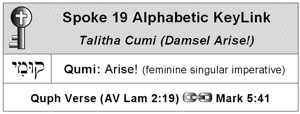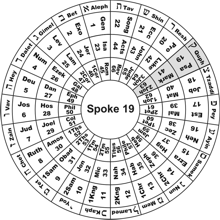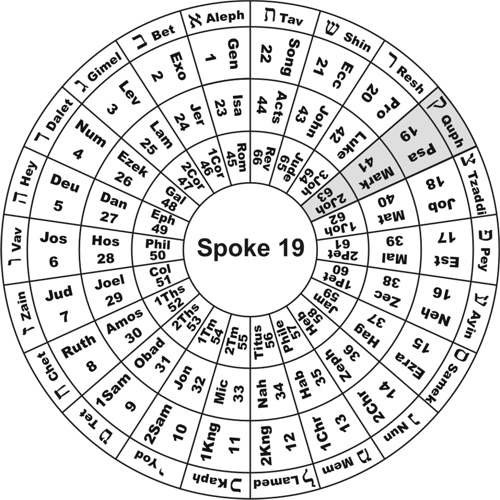Spoke 19 - Quph - Mark: Talitha Qumi! (Alphabetic KeyLink)
And he took the damsel by the hand, and said unto her, Talitha cumi;
which is, being interpreted, Damsel, I say unto thee, arise. And straightway the damsel arose,
and walked; for she was of the age of twelve years. And they were astonished with a great astonishment.
Mark 5:41f (Spoke 19, Cycle 2)
 The
Gospel of Mark is unique in that it has preserved a number of Aramaic words by transliterating them into
Greek characters rather than translating them into Greek words, as is the case in the highlighted word above.
This reveals yet another top-level super-obvious integration of Mark with the Nineteenth Hebrew Letter.
Cumi is based on a fundamental Quph KeyWord! God used it in three Alphabetic Verses: The
Gospel of Mark is unique in that it has preserved a number of Aramaic words by transliterating them into
Greek characters rather than translating them into Greek words, as is the case in the highlighted word above.
This reveals yet another top-level super-obvious integration of Mark with the Nineteenth Hebrew Letter.
Cumi is based on a fundamental Quph KeyWord! God used it in three Alphabetic Verses:
- AV Ps 10:12 Arise (qum), O LORD; O God, lift up thine hand: forget not the humble.
- AV Lam 2:19 Arise (qum), cry out in the night: in the beginning of the watches pour out thine heart like water before the face of the Lord:
- Av Prov 31:28 Her children arise up (qum), and call her blessed; her husband also, and he praiseth her.
 When
I display highlighted KeyWords in the Alphabetic Verses, I generally use the simplest
conjugation, the "dictionary form," since the grammatical details are not usually needed to
understand the meaning that God intended. But in the case of the verse from
AV Lamentations 2:19, a key insight is found by looking at the actual conjugated verb as it
is written in the text. The word used there is the feminine singular imperative. It
is the exact form the Lord Jesus used when He commanded the damsel to arise!
We have, therefore, an Alphabetic KeyLink between the
Quph verse of Lamentations 2 and the Gospel of Mark on Spoke 19. Note that "cumi" and "qumi" are equivalent
transliterations of the Hebrew, but I prefer using the "q" because it corresponds to Quph. When
I display highlighted KeyWords in the Alphabetic Verses, I generally use the simplest
conjugation, the "dictionary form," since the grammatical details are not usually needed to
understand the meaning that God intended. But in the case of the verse from
AV Lamentations 2:19, a key insight is found by looking at the actual conjugated verb as it
is written in the text. The word used there is the feminine singular imperative. It
is the exact form the Lord Jesus used when He commanded the damsel to arise!
We have, therefore, an Alphabetic KeyLink between the
Quph verse of Lamentations 2 and the Gospel of Mark on Spoke 19. Note that "cumi" and "qumi" are equivalent
transliterations of the Hebrew, but I prefer using the "q" because it corresponds to Quph.
Next article: Corban, A Gift (Alphabetic Link)
|



